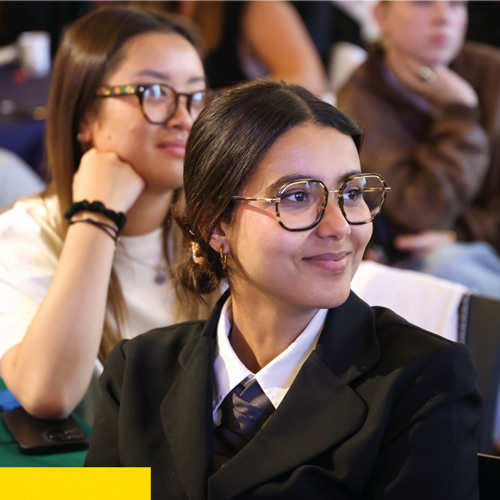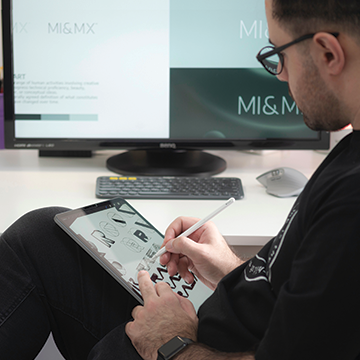
L'alternance dès
la 4ème année
Take a work-study communications course
For certain specializations, EFAP School of Communication students complete their fourth and/or fifth year of study on a work-study program, as part of an apprenticeship or professionalization contract. They alternate one week of classes with three weeks in the company, combining theory and practice. By choosing to offer work-study training in communications from fourth year onwards, we give our students the opportunity to consolidate their knowledge during the three years of initial training, before plunging into the professional world. Three crucial years that enable them to gain maturity and build their network through internships.
We're convinced that the feeling of belonging to a school, class spirit, educational events and dynamic campus life play an essential role in students' personal and professional development. These seminal and memorable experiences play a major role in the construction of future career paths, and make these three years an essential foundation before calmly considering the possibility of continuing one's studies in a work-study program.
How does work-study at EFAP work?
At EFAP, the type of work-study contract depends on the student's status.
The apprenticeship contract is aimed at young people aged 16 to 29, enabling them to obtain a diploma by alternating between the school and a company, with funding provided by the OPCOs. The professionalization contract, on the other hand, is aimed at young people aged 16 to 25 and aged 26 and over, facilitating rapid integration thanks to a balance between courses and practical work experience.
These two contracts enable students on work-study communication courses to gain solid experience while preparing for their degree in the communications and marketing sectors.
What's the schedule?
EFAP's communication work-study schedule is designed to offer an optimal balance between training periods and in-company experience. Students alternate between the school and the company on a schedule of three weeks in the company and one week in the classroom. This schedule enables students in work-study communication programs to consolidate their academic knowledge while applying it directly in a professional environment. In addition, specific periods are set aside for exams and end-of-year projects, ensuring that students can focus fully on their academic success.
The timetable can also vary slightly from campus to campus and according to the partnerships established with companies, offering a flexibility that meets the needs of each student and the expectations of their future profession in communications.
How much does a work-study program pay?
Salaries depend on the type of contract, the student's age and level of study.
Apprenticeship contract: minimum remuneration varies from 53% to 100% of the minimum wage depending on age and year of training.
- 21 to 25 years: 53% to 78% of minimum wage
- 26 years and over: 100% of minimum wage, or even more depending on the company's collective agreement.
Professionalization contract: minimum remuneration also depends on the age and level of training of the apprentice, with percentages calculated on the minimum wage or the conventional minimum salary, whichever is more advantageous.
- 21 to 25 years: at least 70% of minimum wage
- 26 and over: at least the minimum wage or 85% of the conventional minimum salary.
Work-Study Specializations after a Bachelor’s Degree (Bac+3)

Digital Marketing & Business – Two-Year Expert Program
Become a Marketing & Digital Transformation Manager at EFAP. A two-year, career-focused program, accessible in Paris from Bac+3 level.
PARIS
Work-Study Specializations after a Master’s Degree (Bac+4/5)

Communication & Strategic Marketing – Part-Time / Work-Study
Aix-en-Provence - Bordeaux - Lille - Lyon - Montpellier - Nice - Paris - Rennes - Strasbourg - Toulouse
Join a unique program built on a dual expertise in Communication and Marketing.

Communication & Strategic Marketing – Part-Time - Full-English
Bordeaux
Join a unique Full-English program built on a dual expertise in Communication and Marketing.

Communication & Event Management - Part Time
Bordeaux - Lille - Lyon - Paris
Become a well-rounded manager capable of meaningful, strategic communication.

Advertising Creation & Strategy – Part-Time / Work-Study Program
Bordeaux - Lille - Lyon - Paris
Become a creative professional driven by purpose and ideas, mastering the codes and dynamics of a rapidly changing world — the world of advertising.

Sport Business & Communication - Part-Time
Lyon - Paris
Become communication professionals in the sports industry.

Luxury Communication & Strategies Part-Time
Paris
Train students in the key communication challenges and emerging strategic approaches shaping today’s luxury sector.

Digital Marketing & Business - Work-Study / Part-Time Executive
Paris
See the digital revolution as a powerful opportunity to build your professional future. #MBADMB

Digital Marketing & Business IA & Data - Alternance / Part-Time Executive
Paris
Un programme à l'intersection de la tech et du marketing.
Titre RNCP « Manager du marketing et de la transformation digitale » (RNCP 36119).

Digital Marketing & Business Beauty & Cosmetics - Alternance / Part-Time Executive
Paris
Devenez acteur de la révolution digitale du secteur de la beauté et des cosmétiques.
Titre RNCP « Manager du marketing et de la transformation digitale » (RNCP 36119).

Digital Marketing & Business Luxe - Alternance / Part-Time Executive
Paris
Devenez acteur de la révolution numérique de l'industrie du luxe.
Titre RNCP « Manager du marketing et de la transformation digitale » (RNCP 36119).
Program by year